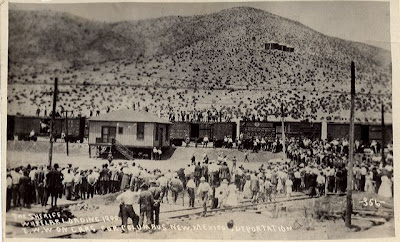 |
| Frame-Breaking by Luddites, 1812 (Frame-breaking was outlawed in 1721 | ) |
June 28, 1816
–Luddites attacked the Heathcoat and Boden's Mill at Loughborough,
smashing 53 frames worth £6,000. Troops were sent in. Six Luddites were
executed. The attack was part of a general revival of violence and
sabotage of machinery following a bad harvest. At this same time, 'Swing' riots erupted in the countryside as a protest against low wages, unemployment & the Game Laws.
 |
| Monument to the Potemkin Mutineers in Odessa |
June 28, 1905
-- The mutinous crew of the battleship "Potemkin" entered the port of
Odessa, which had been taken by revolutionaries. Workers' Councils
formed.
June 28, 1914
– Austria's Archduke Ferdinand was assassinated by the Serbian
anarchist Gavrilo Princip, whose attentat was said to have set off World
War I, which killed between 5 and 10 million soldiers.
June 28, 1916 – 50,000 workers staged a one day protest strike against the trial of Karl Leibnecht.
June 28, 1956 – 100,000 workers struck in Poznañ, Poland, shouting "Bread & Freedom. The protests were violently suppressed, with at least 67 workers killed.
The government sends 10,000 soldiers to the city. The next day, another
70 would be killed, 700 would be arrested, and hundreds more would be
wounded.
June 28, 1969
– Gay activists demonstrated in Sheridan Square and in front of the
Stonewall Inn, where a riot occurred at 3 am earlier this morning when
police raided the bar. Demonstrators were confronted by NYC Tactical
Police.
(All from the Daily Bleed)






















